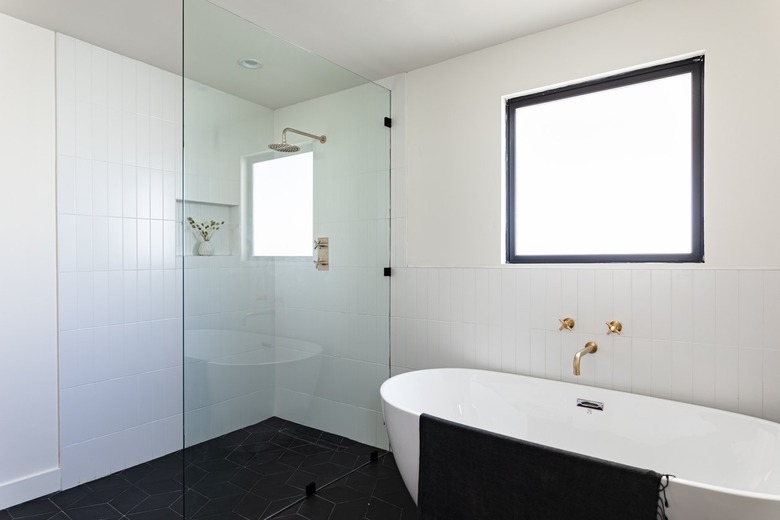21 Questions To Ask A Contractor's References
We may receive a commission on purchases made from links.
Much like a reference letter, when you are considering hiring a building trades contractor, it's common practice to get a reference list of former customers you can contact. In addition to checking for a contractor's license and making sure the professional is insured, talking to a few customers on that reference list should reassure you that the contractor is an honest and competent professional. But, it's important to remember that most contractors will give you a curated list of former customers who are likely to give highly positive reviews. So, there's limited value to such a client list unless you ask questions that are very carefully phrased and specific.
If you ask the right questions and listen carefully, there's a good chance you can get below the surface and learn some genuinely useful information about the contractor you are considering, whether it is a remodeling general contractor or a licensed electrician.
21 Questions to Ask a Contractor's References
1. Can you describe what kind of work was done?
This question simply aims at making sure you're comparing apples to apples — that your project or remodel is similar to that of the client on the reference list. You can't fairly compare projects that are radically different in scope or complexity. The closer the project matches your own, the more relevant the information will be.
2. How did you find this contractor?
A contractor who finds their clients through word of mouth from satisfied customers is almost always a good one. Look for a pattern of this in the reference clients to whom you speak. Phrases like, "I saw what they did for my neighbor" or "My sister-in-law recommended him" are exactly what you want to hear.
3. How did the negotiation go?
Find out if the former client negotiated prices or services with the contractor and if so, how the process worked. Was the contractor willing to legitimately reduce their profit to help the budget, or did they simply reduce their services in order to lower costs? A contractor who finds ways to help homeowners stay within a budget is someone with whom you'll probably enjoy working. Also, find out what kind of formal contract was used to finalize the agreement.
4. Did the contractor help with design?
Good remodeling contractors will be able to offer suggestions on various aspects of the project design, from basic layout to choice of materials and colors. The contractor may have a good aesthetic sense of their own, or they may partner with a good designer. Listen carefully as the reference clients describe how the project was planned and designed.
5. When did delays occur? Why did they occur?
Let's be real: It's a rare home renovation project that is finished precisely on schedule. Rather than asking the expected question about whether the contractor finished on time, probe a little deeper and try to find out how long the work delays were and why they occurred. It's no big deal for a project to go quiet for a day or two here and there while that work team waits for cabinets to be delivered or a subcontractor to show up, but if you begin to hear several stories about work halting for days or weeks at a time, it may hint at some deeper project management problems for the contractor. Prolonged delays sometimes occur when a contractor is having trouble paying their bills or their laborers.
6. How does the contractor respond to phone calls and text messages?
Almost no busy contractor can respond instantly when you phone or text message them, and you shouldn't expect them to do so. With a reputable contractor, clients can expect a predictable pattern of response — often in the evenings after the work day is done or perhaps during lunch breaks. Find out if you should expect callbacks from the actual contractor or if you'll have to communicate through a secretary.
7. Did the work crew work regular hours? Nights and weekends?
If the contractor's workers regularly work extended hours, you'll have a better chance of getting your project done on time. On the other hand, you may not want a contractor who is disturbing your peace and quiet on evenings and weekends. Look for a work pattern that matches your preferences.
8. How did the workers get along?
If work crews and subcontractors know and clearly like each other, it usually means they will work together efficiently. This can only be a good thing for the general success of your project. However, too much socializing on the job site may indicate a residential contractor who doesn't manage firmly.
9. How bad was the mess? What was the cleanup process?
All major home improvement projects are messy, but if the former clients have rueful comments about the mess, it can be a warning sign. Almost all good contractors will do a good job of final cleanup, but excellent contractors will do cleanup of the work site at the end of each day, often with an extra-deep cleaning occurring at the end of each work week. Find out if the waste disposal involves a drop-off dumpster, and if so, who manages that process. Some contractors will push the dumpster rental onto the homeowner.
10. Were you comfortable allowing the work crew access to your home? Did they have their own keys?
To ensure speedy work, most contractors like to have access to the home when owners are absent. Ask the references about this and if they felt comfortable allowing workers accessibility into the empty home. Did the workers use the client's bathroom, or did they arrange for an outdoor portable restroom?
11. How many different workers were involved?
The best projects usually have a limited number of workers who are dedicated to the project and are with it from beginning to end, not a stream of different laborers who come in and out. If you see too many different workers, it's often a sign that they are temps or part-timers, not permanent employees. Also ask about how often the contractor was on-site: Daily? Weekly?
12. What did your neighbors think of the project? Could I talk to them?
Often, the immediate neighbors have interesting things to say about a contractor. One neighbor with an award-winning garden was aghast to find a masonry crew washing their tools and letting lime-laden water flow into his garden and spoil the soil. A good report from surrounding neighbors is a positive sign.
13. How was the noise?
All remodeling and projects in the construction industry create a lot of noise, so don't expect otherwise. Good contractors may take measures to block or deaden the sound, and they are respectful about not running heavy power tools at hours that will disturb the neighborhood.
14. Were they careful with the landscaping?
Major home improvement projects can wreak havoc on a yard, especially exterior work, such as house painting, siding, and roofing. Even indoor projects can be hard on a landscape as workers tromp inside with materials and outside with waste. Ask about the impact on trees, shrubs, lawns, and planting areas.
15. Did the permit and inspection process go smoothly?
Ideally, the reference clients will have no real memory of the building inspections since good contractors do fine work that easily passes inspection and is done according to building codes. Often, the homeowner doesn't even realize that the inspection occurred. If the client mentions any problems with the project passing inspection or with permits being issued, it's a warning sign. Good contractors virtually always handle the permit applications themselves; they never push this duty onto the homeowners.
16. How did the walk-through go? Were there last-minute fixes or changes?
Good contractors schedule a visual walk-through with the client near the end of the project to review all aspects of the work and discuss any last-minute changes or fixes. The walk-through is also the time when customers should get advice about maintenance and warranties. Good contractors will hand over any documentation on the appliances and materials. If clients don't remember any of this happening, it indicates that the contractor is not overly concerned with satisfying the customer.
17. What would you do differently?
Even a client who has an overall raving review of a contractor's work will sometimes wistfully mention something she wished had been different. Even if the overall satisfaction level was high, just about everybody who is asked this question will give you an answer that can help identify a contractor's weak spots.
18. How close was the final cost to the bid? What drove the cost overruns?
As with scheduling overruns, almost every major remodeling job has at least some amount of cost overrun. Much of the time, this is driven by the customer, who decides along the way that they want more elegant materials or an extra feature that wasn't discussed at the time the bid was issued. Such overruns are normal and not a cause for concern, but if you hear different clients say they don't understand why the project ended up costing so much, it's a signal that the contractor doesn't bid very accurately.
19. Did you recommend this contractor to any relatives or friends? Could I contact them?
If the reference client liked the contractor well enough to recommend her to a relative or close friend, it's a very good sign. Probe for specifics here. If the contractor was recommended to a boss or brother and not just a casual neighbor then it's a sure bet that the client's experience was a good one. If possible, follow up and call these second-tier references.
20. Do you have any before/after photos?
Many people will be eager and proud to show you the dramatic improvement brought about by their home remodeling project. Looking at these photos may well stimulate more questions and further information.
21. What kind of payment schedule was used?
Every contractor has a preferred payment schedule. Some request 50 percent up front to cover the cost of materials, and then the balance is payable at the end of the project. Others divide the payment into thirds. Any good contractor should allow you to hold back a meaningful final payment that is contingent on your satisfaction with the work. If the reference clients didn't have this arrangement with the contractor, you should wonder why.
Tips for Interviewing a Contractor's Reference Clients
Tips for Interviewing a Contractor's Reference Clients
When you call a contractor's reference, always try to arrange for an in-person meeting if possible. Some might prefer to simply talk on the phone, but a short in-person interview almost always yields more information, especially if you can meet at his home where he can show you the completed project.
Some people are reluctant to invite strangers into their home but are quite happy to meet you at a restaurant or coffee shop. If the individual seems reluctant to meet in person, then a phone conversation is fine. Rather than trying to wring a lot of information out of the initial unexpected phone call, try to arrange for a leisurely half-hour phone call at another appointed time.
A token of appreciation can go a long way. Most people will appreciate an invitation for coffee or lunch. One couple checking out a general contractor's references offered a small potted plant to each reference who graciously gave of their time.
It's best to check out at least three references to get a good idea of how the contractor works and the level of satisfaction experienced by clients.



